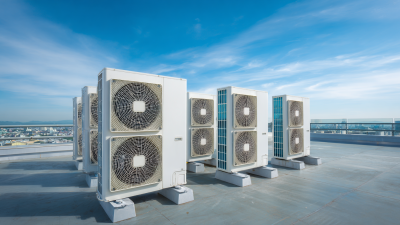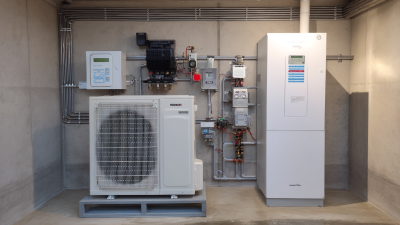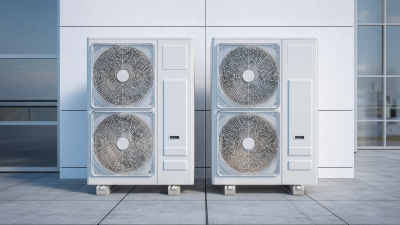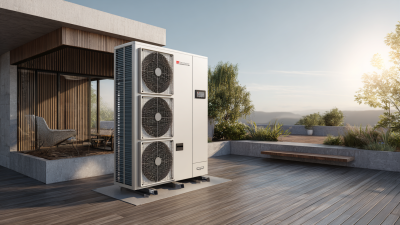Leave Your Message
In recent years, the demand for energy-efficient heating solutions has surged, as homeowners seek to reduce their carbon footprint and energy costs. According to the U.S. Department of Energy, heating and cooling account for nearly 50% of the average home's energy usage, making the choice of heating systems critical for energy efficiency. An Energy Efficient Heat Pump, renowned for its ability to transfer heat rather than generate it, can cut energy consumption by up to 50% compared to traditional heating systems. Furthermore, the adoption of such technologies aligns with the growing trend towards sustainable living, with the market for heat pumps projected to grow significantly, reaching a valuation of over $28 billion by 2027, as reported by ResearchAndMarkets.com. This guide will provide a comprehensive checklist to help homeowners navigate the essential considerations when choosing the right Energy Efficient Heat Pump for their home, ensuring Not only comfort but also significant energy savings.

When it comes to selecting an energy-efficient heat pump for your home, understanding the different types available is crucial. Air source heat pumps are among the most popular options due to their versatility and lower installation costs. They work by extracting heat from the outside air and transferring it indoors, making them effective even in cooler temperatures. Air source heat pumps are ideal for moderate climates and can significantly reduce electricity bills while providing both heating and cooling functions.
Ground source heat pumps, also known as geothermal heat pumps, utilize the stable temperatures underground to maintain comfortable indoor conditions. They involve burying a series of pipes in the ground, where they absorb heat during cooler months and dissipate heat during the warmer ones. Although the initial investment is higher, ground source heat pumps offer exceptional energy efficiency and longevity, making them an attractive option for homeowners looking to reduce their long-term energy costs.
Water source heat pumps are another viable choice, particularly for homes near a body of water. These systems draw heat from the water and are highly efficient due to the thermal stability of aquatic environments. However, they require specific conditions and permissions for installation. Understanding the unique benefits and considerations of each heat pump type will help you make an informed decision tailored to your home’s needs and climate.
This chart illustrates the average efficiency ratings of different types of heat pumps, enabling homeowners to make informed decisions based on energy efficiency.
When selecting an energy-efficient heat pump, understanding the energy efficiency ratings is crucial. The Seasonal Energy Efficiency Ratio (SEER), Heating Season Performance Factor (HSPF), and Coefficient of Performance (COP) are all critical metrics that provide insight into a heat pump's efficiency. According to the U.S. Department of Energy, a higher SEER rating indicates better cooling efficiency over a cooling season, with models ranging from a minimum of 14 SEER to over 25 for high-efficiency systems. Consumers should aim for units with SEER ratings above 16 to significantly reduce energy costs.

The HSPF rating measures the heating efficiency of a heat pump, with a range typically from 7.7 to 10 or higher. A heat pump with an HSPF of 8.2 uses about 25% less energy compared to another one rated at 7.7, which can lead to considerable savings, particularly in colder climates. Furthermore, the COP provides a snapshot of the heat pump's efficiency at specific conditions, comparing the heat output to the electrical energy input. A COP of 3.0 means the heat pump produces three units of heating for every unit of energy consumed, representing an effective system that can help homeowners lower their energy consumption significantly. When choosing a heat pump, focusing on these three ratings is essential for maximizing energy efficiency and overall cost savings.
When considering an energy-efficient heat pump for your home, understanding the financial implications is crucial. The initial investment in a heat pump can be significant, often ranging from $3,000 to $7,000 depending on the model and installation requirements. However, this upfront cost is only part of the story. Many homeowners overlook the long-term savings that an efficient heat pump can provide, particularly in terms of reduced energy bills. With lower operational costs compared to traditional heating systems, such as furnaces or electric baseboards, heat pumps can cut energy expenses significantly, potentially saving homeowners thousands over their lifespan.
Additionally, heat pumps come with the added benefit of longevity. While the initial outlay might be higher, most heat pumps have a lifespan of 15 to 25 years, which can further justify the initial expense. Furthermore, many regions offer incentives and rebates that can alleviate the initial costs, making energy-efficient heating more accessible. In essence, while the up-front investment may appear daunting, the long-term savings and environmental benefits provide compelling reasons to choose a heat pump for your home heating needs.

When selecting an energy efficient heat pump, understanding your local climate is crucial for optimal performance. Heat pumps operate by transferring heat from one area to another, relying heavily on the temperature differences between the indoors and outdoors. In regions with milder climates, a heat pump can perform remarkably well with minimal energy consumption, effectively maintaining comfort levels throughout the year. Conversely, areas that experience extreme temperatures—either very hot or very cold—may require a more robust system or additional heating sources to meet heating and cooling demands efficiently.
Additionally, humidity plays a significant role in how heat pumps function. In humid climates, heat pumps can efficiently remove excess moisture from the air, leading to enhanced comfort. However, in drier climates, the same system might need adjustments to maintain indoor humidity levels. Therefore, it's essential to factor in local weather patterns, seasonal variations, and average humidity when choosing a heat pump. With considerations of your area's climate, you can ensure that your heat pump operates effectively, providing energy savings while keeping your home comfortable year-round.
When selecting an energy-efficient heat pump for your home, sizing is crucial for maximizing both comfort and efficiency. According to the U.S. Department of Energy, improper sizing can lead to significant energy waste, as a unit that is too large will cycle on and off frequently, while a unit that is too small will struggle to maintain desired temperatures. This inefficiency can increase your energy bills by as much as 15%, depending on the unit's performance characteristics and climate.
Proper sizing involves calculating the heating and cooling load of your home, which factors in variables such as square footage, insulation quality, and local climate. The Air Conditioning Contractors of America (ACCA) recommends that homeowners conduct a Manual J calculation, which provides precise assessments and helps ensure that the selected heat pump operates at optimal efficiency.
An accurately sized heat pump can significantly enhance indoor comfort levels, providing consistent temperatures and improved air quality, which are key components to a healthy living environment. Choosing the right size ultimately not only saves energy but also extends the lifespan of the installation.






